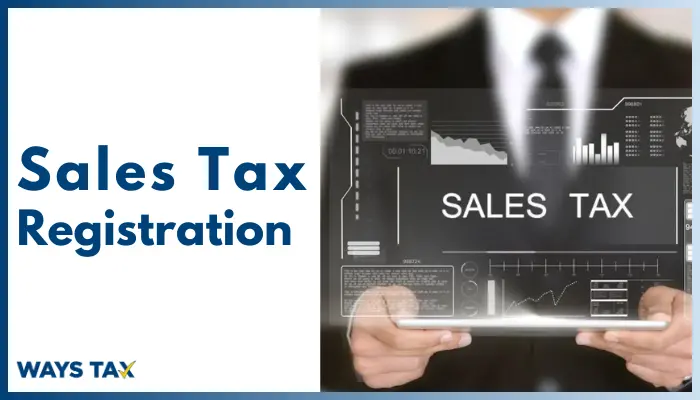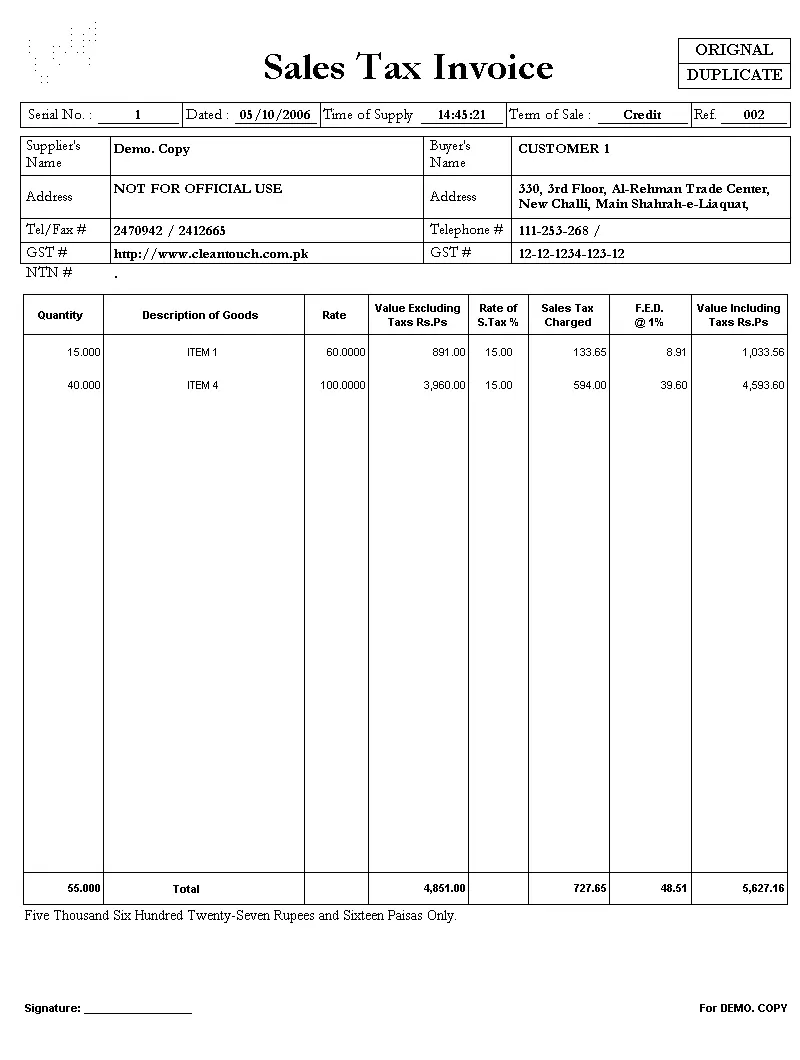
Sales Tax Registration Service in Pakistan – Professional Consultants at Ways Tax
Running a business in Pakistan requires strict compliance with federal and provincial tax regulations. If you supply taxable goods or services, obtaining a Sales Tax registration service in Pakistan is not optional, it is a legal requirement.

At Ways Tax, trusted tax filing company, we provide a complete Sales Tax Registration Service in Pakistan. Our services include documentation, FBR registration, provincial sales tax registration, and compliance management.
Whether you need sales tax registration service in Karachi, Lahore, Islamabad, or anywhere in Pakistan. Our experts handle everything professionally and efficiently.
What is Sales Tax in Pakistan?
Sales tax is a consumption-based tax imposed on the supply of goods and services.
It is regulated by:
- FBR (Federal Board of Revenue) – for goods (GST)
- Provincial Revenue Authorities – for services (SST, PST, KST, BST, CST)
Sales tax is governed under the Sales Tax Act, 1990, and applicable provincial laws.Businesses must obtain a Sales Tax Registration Number (STRN) before charging or collecting sales tax.
Why is Sales Tax Registration Important?
1. Legal Compliance
Sales Tax registration ensures your business operates legally under FBR laws. Failure to register when required can result in penalties, business restrictions, and legal notices.
2. Access to Input Tax Credit
Registered businesses can claim input tax credit on Sales Tax paid on purchases. This reduces overall tax liability and improves cash flow.
3. Avoidance of Fines and Penalties
Non-registration or late filing may lead to heavy fines, default surcharges, and even blacklisting by tax authorities. Registration protects your business from unnecessary legal risks.
4. Business Growth and Global Expansion
Sales Tax registration enhances credibility and allows businesses to:
- Work with corporate clients
- Participate in tenders
- Engage in imports and exports
- Expand operations internationally
Who is Eligible for Sales Tax Registration in Pakistan?
The following categories must register for Sales Tax:
1. Importers, Wholesalers, and Distributors
All commercial importers and wholesale distributors are required to register, regardless of turnover.
2. Manufacturers (Excluding Cottage Industry)
Manufacturers other than cottage industries must obtain sales tax registration if they produce taxable goods.
3. Tier-1 Retailers
Retailers operating under the Tier-1 category as defined by FBR (large retail outlets, branded stores, integrated POS systems, etc.) All of these are required to register.
4. Businesses Registered for Provincial or Federal Taxes
Entities already registered under other tax regimes may also be required to obtain Sales Tax registration depending on their activities.
5. Zero-Rated Suppliers
Businesses involved in zero-rated supplies (such as exports) must register to claim refunds.
6. Retailers Accepting Digital Payments
Retailers accepting debit/credit cards or digital payments and meeting FBR criteria may be required to register.
7. Businesses Exceeding Withholding Tax Thresholds
Businesses crossing certain turnover thresholds under withholding tax provisions may also fall under mandatory registration.
8. Jewelry Suppliers
Jewelry manufacturers and suppliers have specific compliance requirements under Sales Tax law.
Sales Tax Registration Procedure in Pakistan (Step-by-Step)
Here’s how our Sales Tax Registration service online works:
Step 1: NTN Registration
Your business must first have:
- Active NTN
- Registered business structure (SECP / AOP / Sole Proprietor)
Step 2: FBR Iris Portal Registration
We register your business on the FBR Iris Portal and apply for your STRN (Sales Tax Registration Number).
Step 3: Business Verification
FBR may conduct:
- Physical verification
- Bank account verification
- Business premises confirmation
Step 4: STRN Issuance
Once approved, you receive:
- Active STRN
- ATL (Active Taxpayer List) visibility
- Authority to charge sales tax
We also handle FBR Sales Tax Registration verification to confirm active status.
Documents Required for Sales Tax Registration in Pakistan
To complete your registration smoothly, the following documents are required:
- NTN Certificate
- Incorporation Certificate / Business Registration Proof
- Memorandum & Articles (for companies)
- CNIC copies of directors/owner
- Business bank account certificate
- Tenancy agreement / ownership documents
- Latest utility bill (not older than 3 months)
- Business letterhead
- Contact details & email
Our team ensures all documents are properly arranged to avoid rejection.
List of Goods Exempted From Sales Tax in Pakistan
Certain goods are exempt under the Sixth Schedule of the Sales Tax Act, including:
- Basic food items (selected categories)
- Educational books
- Certain agricultural products
- Medical supplies (as notified by FBR)
Exemptions may change through annual Finance Acts.
What is a Sales Tax Invoice?
A Sales Tax invoice is a legally required document issued by registered businesses. It must include:
- Seller’s name and STRN
- Buyer’s name (if registered)
- Invoice number and date
- Description of goods/services
- Tax rate and amount charged
Proper invoicing is essential for claiming input tax credit.

Sales Tax Registration Fee in Pakistan
– Government Fee
There is generally no official government fee for basic FBR sales tax registration.
– Professional Fee
Professional consultancy charges vary depending on:
- Business type
- Province
- Complexity
- Physical verification requirements
At Ways Tax, we offer affordable and transparent pricing for our Sales Tax Registration Service Pakistan-wide.
Our Sales Tax Registration and Filing Services
At WaysTax, we provide comprehensive Sales Tax services across Pakistan.
1. GST Sales Tax (Goods and Services Tax)
Complete registration and monthly return filing under federal GST.
2. SST Sales Tax (Sindh Sales Tax)
Sindh sale tax registration and filing under the Sindh Revenue Board for services in Sindh.
3. CST Sales Tax (Capital Territory Sales Tax)
Capital sales tax registration service for businesses operating in Islamabad Capital Territory.
4. PST Sales Tax (Punjab Sales Tax)
Punjab sales tax registration services under the Punjab Revenue Authority.
5. KST Sales Tax (Khyber Pakhtunkhwa Sales Tax)
Khyber Pakhtunkhwa sales tax registration and filing under the KPK Revenue Authority.
6. BST Sales Tax (Balochistan Sales Tax)
Balochistan sales tax registration and filing under the BRA
Benefits of Filing Sales Tax in Pakistan
Filing Sales Tax returns regularly offers several advantages:
1. Legal Compliance
Ensures that your business meets all statutory requirements and avoids legal complications.
2. Claim Input Tax Credits
Proper filing enables adjustment of input tax against output tax, reducing overall payable tax.
3. Improved Business Credibility
Registered and compliant businesses gain trust among customers, suppliers, and financial institutions.
4. Access to Government Contracts
Most government tenders require valid sales tax registration and filing status.
5. Facilitates Business Growth
Compliance strengthens your financial profile and makes it easier to secure loans and partnerships.
6. Sales Tax Refunds on Zero-Rated Supplies
Exporters and zero-rated suppliers can claim refunds, improving liquidity.
7. Avoidance of Audits and Investigations
Accurate and timely filing minimizes the risk of audits, inquiries, and notices from tax authorities.
Why Choose Ways Tax for Sales Tax Registration Service?
- Complete Registration Support – We handle the full Sales Tax Registration procedure in Pakistan, from NTN to STRN issuance.
- Federal & Provincial Expertise – GST (FBR), SST, PST, KST, BST & CST — all under one roof.
- Fast E-Filing Processing – Smooth and hassle-free E-filing of Sales Tax Registration.
- Proper Documentation Guidance – Assistance with all documents required for sales tax registration in Pakistan.
- Verification & Compliance Support – Help with FBR Sales Tax Registration Verification and ongoing filing.
- Transparent Fee Structure – Clear guidance on Sales Tax Registration fee in Pakistan.
Ways Tax ensures quick registration, full compliance, and zero unnecessary delays.
FAQs
Simplify Your Sales Tax Compliance with Ways Tax
Tax compliance can be complex and time-consuming. Let WaysTax handle your sales tax registration service and filing with professionalism and accuracy.
Contact WaysTax today for a smooth, hassle-free registration and filing experience. Let us manage your compliance while you focus on growing your business.
